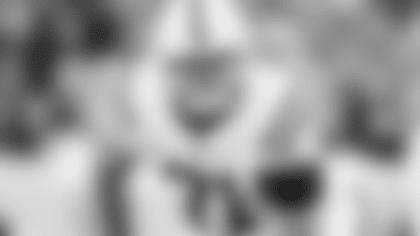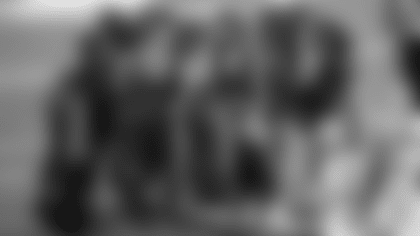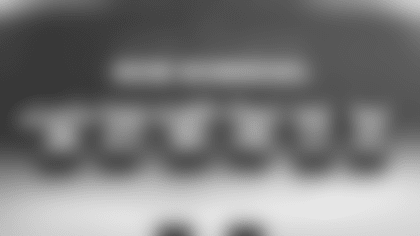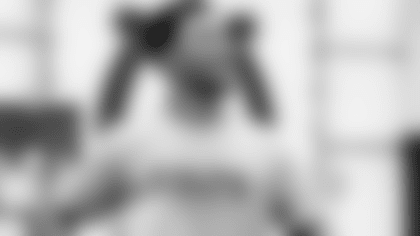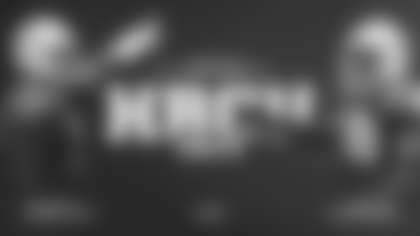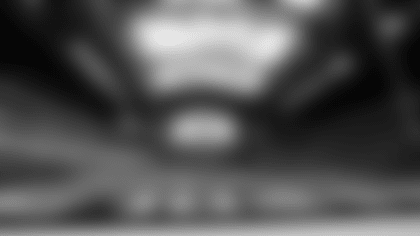INDIANAPOLIS – What seemed a natural means of communication between a father and son really was not.
What it was was special, and it remains so until today.
Jamaal Anderson is in his first year as a defensive end for the Colts. It is the fifth professional season for Anderson, who spent 2007-10 playing with the Atlanta Falcons.
Anderson has made a living fending for himself on the football field. It is a difficult profession to have and while sports are a survival of the fittest, it is not survival in life itself.
The best example of truly fending for one's self in the Anderson family comes from Jamaal's father, Glenn.
While growing up on the Southside of Chicago in the 1950s, Glenn Anderson was hit with a case of pneumonia at age 10. Treating the illness medically would come at a cost. That cost changed Glenn's life, and years later it would impact the lives of his wife, Karen, and children, Danielle and Jamaal.
"When he was 10 years old, he got pneumonia real bad," said Anderson of his father. "Whatever the medicine was at that time in the early 1950s, one of the results of it was the possible loss of hearing and/or sight. He lost his hearing."
The debilitating matter altered Glenn's life, but it did nothing to de-rail him from a lifetime of accomplishments. He went on to attend Gallaudet University in the District of Columbia. Gallaudet is a federally chartered university for the education of the deaf and hard of hearing. It was the first school for the advanced education of the deaf and hard of hearing in the world, and is still the only higher education institution in which all programs and services are specifically designed to accommodate Deaf and hard of hearing students.
Glenn thrived at the school, and he took his education farther than undergraduate study. With a degree in psychology, he then attended graduate school at the University of Arizona and in 1981, he received at Ph.D in rehabilitation counseling at New York University. Glenn became the first deaf African American in the country to earn a Ph.D. There, he met Karen, and they eventually had two children.
In 1982, the family moved from New York to Arkansas. Glenn joined the University of Arkansas' Research & Training Center for Persons Who are Deaf or Hard of Hearing as Director of Training. He is currently at the University of Arkansas at Little Rock and is an Assistant Professor in the Interpreter Education Program. Jamaal was born and grew up in Little Rock.
Jamaal cannot really remember when it dawned on him that his father was deaf. It was something that did not seem out of the ordinary to him while he was young.
"I can't remember what age I was when I fully understood my dad's situation," said Anderson. "It was something I grew up around. It was nothing different to me. It was just my father. I never looked at it like he was incapable of doing things. It was something I grew up around. I had been doing it (sign language) since I was growing up. I could not tell you when I was not signing. When I was growing up, I just recall doing it.
"To start me getting better, my dad got me a book and said I needed to start learning it because of his situation. I still have a book to this day that I still look at. There were certain things he would help me out with. I would finger-spell something, and he would give me the sign for it. We would work on small stuff like that."
The whole Anderson family is conversant in signing. Danielle had a geographic advantage that helped her advance quicker than her younger brother.
"She is better than me at it," said Anderson. "She grew up in New York and there was a larger deaf community there than there is in Little Rock, Arkansas, where I grew up. She's a lot better than I am at it, but I'm doing fine."
Anderson has not stopped appreciating the extra lengths to which his father was dedicated in making life as normal as possible and to not use any situation to hold him back from accomplishments.
"He definitely had to overcome being deaf," Anderson said of his father. "He told me he had to spend a lot of time in the library reading and having to learn on his own. He had people who picked on him. He had to deal with growing up on the Southside of Chicago, but he stayed strong. He was resilient and became a great man after that.
"I respect him a lot for what he has done. He did not back down from the challenge he faced. He confronted it, learned about it and applied himself to overcome it. It was nice growing up in an environment where you had such a role model. I think he instilled a lot of those things in me as well."
Anderson sees others who did not have the family structure from which he benefited. It also was his father's intent on making his children grow educationally that impacts Anderson today.
"I am definitely grateful for the relationship I have with my father, both now and then," said Anderson. "There are a lot of fathers who aren't in their son's lives. That was not the situation for me. He always was in my life. He was a big sports fan. He always wanted me to work hard on the football field. At the same time, he wanted me to be very studious. I can recall never really having too much time off during the summer or spring break. You'd think it was time to get away from school, but when I was growing up I had to do book reports and all types of assignments he had me doing just to keep me focused on my school work and staying a top student. That definitely paid off as well."
When he joined the Colts, Anderson asked about opportunities to help local deaf students. His desire to impact young lives led to a recent opportunity where he visited students at the Indiana School for the Deaf. Anderson's visit was a big hit with students and faculty.
Andy Alka, the principal of the Indiana School for the Deaf knows that Anderson's appearance meant a great deal to the students and staff.
"(When) someone speaks their language, someone who knows what it's like to grow up in that same environment and many of our staff (it's the) same situation," said Alka to the club's media group. "For him to be able to come in here and share that with our kids, I'm just thrilled and honored that he was able to do that."
Anderson loved the interaction with the students. It was a way of lessening the distance between them and a professional athlete who is attuned to what they contend with in daily life.
"Being able to go and speak to the kids and bring some excitement was a good thing," said Anderson. "I wanted to show them that football players are real and that I know exactly what they're going through because of my father's situation. It was a great opportunity to be out in the community and show support to the students.
"I am more a conversational type when doing sign language. We did a nice question-and-answer at the Indiana School for the Deaf. The students had a great time. I'm still hearing about it today from them. A lot of the parents of the students definitely appreciated me being there. Just speaking to the principal, they were just so ecstatic about how it impacted those kids' lives. Sometimes you don't think what you can do in kids' lives, but they're still talking about it. We're planning on doing this again next year. Any time you can be a positive role model and help kids out, it's a blessing."
Anderson does not plan to stop his work once his playing days are done. He has noticed the work of Mike Glenn, a former NBA player, who holds camps for deaf youth. Anderson has been a camp teaching participant, and it is something he plans to do in the future, too.
"It's definitely been a passion of mine to move forward with this (signing to help others)," said Anderson. "One thing is to look around at other people who have made an impact in this area. A person in particular is Mike Glenn. He played for years in the league and now is a broadcaster. He's been doing a camp for deaf people for many years, and this is my second year helping him out at his camp. It's exciting for me to go there and see the work he does with others. Hopefully, I eventually can get my own camp in this aspect, whether it's football or basketball."
Anderson plans to become more advanced in his signing mission, hoping one day to be as proficient as his father.
"You can do anything that you believe. My father is a true testimony to that, and I think I am as well."
Today, communicating between father and son is a natural occurrence. Technology even has improved the process that Jamaal was weaned on early in life.
"The great thing now is with technology so far advanced we have IPad2's and we're able to sign to each other," he said. "We interact that way, too."




